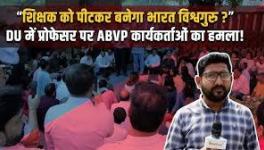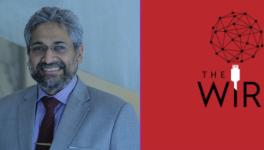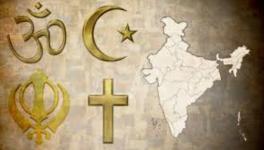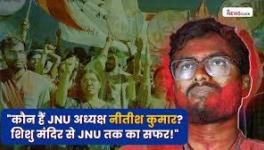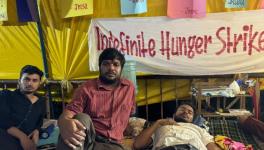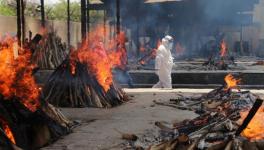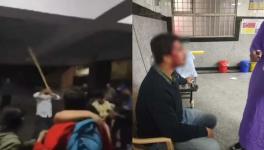Larger Meaning of Left Alliance’s Victory in JNUSU Elections
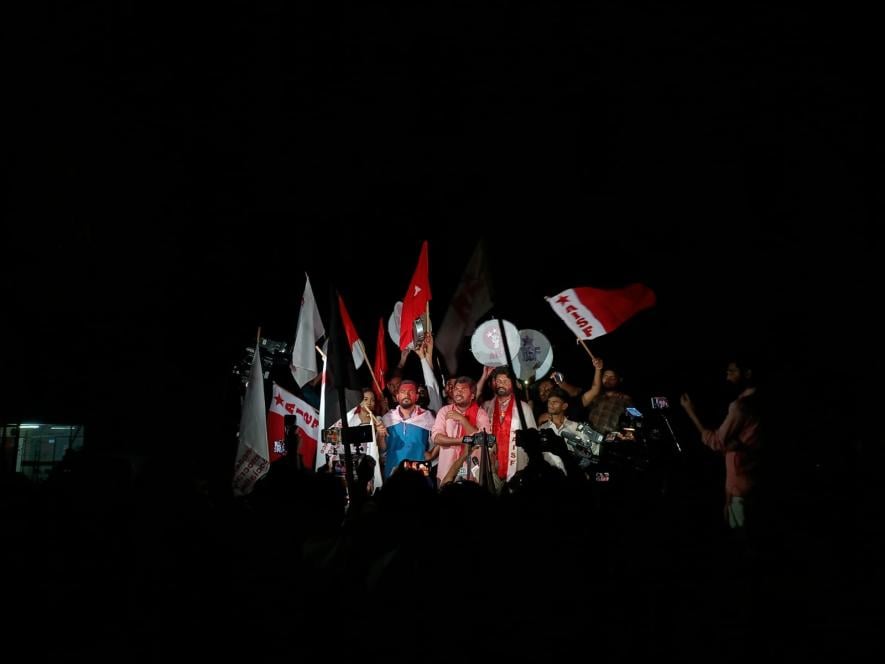
Left alliance candidates sweep JNUSU elections. (Image Credit: SFI Delhi on X)
The victory of students of Jawaharlal Nehru University (JNU) from the Left alliance panel for the posts of president, vice president, general secretary and joint secretary of Jawaharlal Nehru University Students’ Union (JNUSU) by decisively defeating all candidates of Akhil Bharatiya Vidyarthi Parishad (ABVP), a Right-wing students’ organisation affiliated to Rashtriya Swayamsevak Sangh, clearly proves the resilience of JNU. Particularly so in face of an all-out attack on JNU by the powers that be, first to denigrate it and eventually demolish its ethos rooted in dissent and clash of ideas.
Victory for Plurality
The way in which the Left alliance candidates belonging to diverse faiths and caste groups, including Dalit categories, won the elections testify to the idea of JNU that celebrating diversity and plurality, so integral to the ‘Idea of India.’ For instance, the Left alliance candidate for president, Dhananjay (AISA), hailing from Dalit community, secured 2,598 votes in contrast to his nearest ABVP rival, Umesh Ajmeera, who got only 1,676 votes and was defeated by 922 votes. Left candidate Avijit Ghosh (SFI) was declared elected as the vice president, bagging 2,409 votes and defeating his ABVP opponent Deepika Sharma who got 1,482 votes and lost by 927 votes. Left- backed candidate Priyanshi Arya of BAPSA registered victory for the post of general secretary by getting 2,887 votes, 926 more than her ABVP contestant Arjun Anand, who got only 1961 votes. The Left alliance candidate Mohammad Sajid (AISF) was elected joint secretary by trouncing ABVP’s Govind Dangi by 508 votes. While Sajid secured 2,574 votes Govind in contrast could secure 2,066.
It has been reported in the social media that out of four elected Left candidates for the central panel, Dhananjaya and Priyanshi Arya, hail from Dalit community. Added to the list of victorious candidates is Mohammad Sajid who is from minority category. None of these students are focusing on their immediate identities shaped by their castes or faiths, but the diversities they represent affirm their affiliation to ‘idea of India’ of which JNU is a part. Their victory, in fact, represents a victory for diversity and pluralism which often stands in sharp contrast to the divisive majoritarianism of Right-wing forces causing havoc to the constitutional vision of India.
Idea of JNU
The ‘Idea of JNU’ flows from the ‘idea of India’, which is based on liberal, secular, civilisational, universal and constitutional values. It truly represented in every sense of the term what Jawaharlal Nehru so eloquently articulated in 1948 as the vision of a university as "the adventure of ideas and search for truth".
JNU is such a role model of an institution of higher education that its progressive features should be replicated in every other university of our country. It is unfortunate that it is targeted by the government which is led by people who are incapable of appreciating what education means and how clash of ideas is a critical factor for the cultivation of mind and growth and advancement of the nation.
Dhananjay’s Profound Victory Speech
Dhananjay, on getting elected as president of JNUSU, very thoughtfully said that the victory of students of Left alliance represented the struggle of farmers, many of whom laid down their life for fighting and demanding MSP (minimum support price) for their crops. He also invoked Rohith Vemula who nursed the challenging hope of becoming a space scientist like Carl Sagan and was forced to take his own life in Hyderabad Central University where he faced massive discrimination on account of his Dalit identity. He very poignantly said that the victory of all candidates for JNUSU’s top four posts represented the struggle of Vemula, in the words of Ambedkar “to reclaim human personality”.
In his victory speech, Dhananjay flagged the resilience of JNU. While doing so the essence of what he said is of seminal importance. He stated and asserted forcefully that no matter how much coercive action the ‘powers that be’ take against them by mercilessly wielding lathis and employing poisonous propaganda to dub JNU as a ‘nursery for producing so- called urban Naxals”, the students would prove that to be false and malicious by upholding the constitutional vision of India.
The newly-elected JNUSU president also referred to the folk wisdom embodied in the saying that ‘a drop of tear in the eye of the oppressed’ constitutes a threat to those wielding power to trample people’s rights. He then added that an eye with that tear represented the ocean in which the oppressor would get drowned.
He also stated that the regime that had “unleashed oppression” by cutting off funds for education, library facilities for students and their scholarships would get drowned in that ocean. Describing the library of a university as its ‘soul’, he indicted the Narendra Modi regime for endangering the ‘soul’ of JNU, which is now bereft of funds for the cause of students’ quest for cultivation of their minds.
Dhanajay’s powerful speech also underlined the point that the 2024 general elections gave an opportunity to change the regime which “has done enough damage to education and hurt India as a whole.”
Struggle of Youth Represented in Victory
The victory of Left Unity panel in JNUSU signals that the struggle of the youth to salvage India from communal and fascist forces is possible and that the unity of progressive forces was a critical necessity. JNU has set in motion the march to fructify our cherished hopes of defeating communal and divisive forces controlling the State apparatus. Even if it is a small step, it is an important step in that direction.
The writer studied in JNU in the late 1970s and early 1980s and served as Officer on Special Duty to President of India K R Narayanan, who was Vice Chancellor of JNU during 1978-1979. The views are personal.
Get the latest reports & analysis with people's perspective on Protests, movements & deep analytical videos, discussions of the current affairs in your Telegram app. Subscribe to NewsClick's Telegram channel & get Real-Time updates on stories, as they get published on our website.









